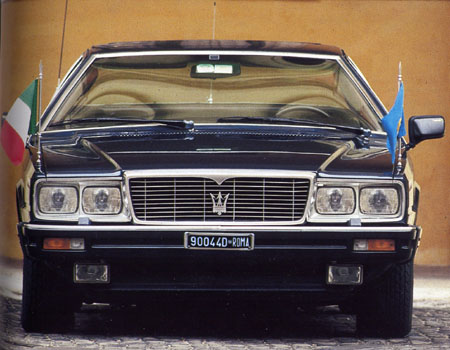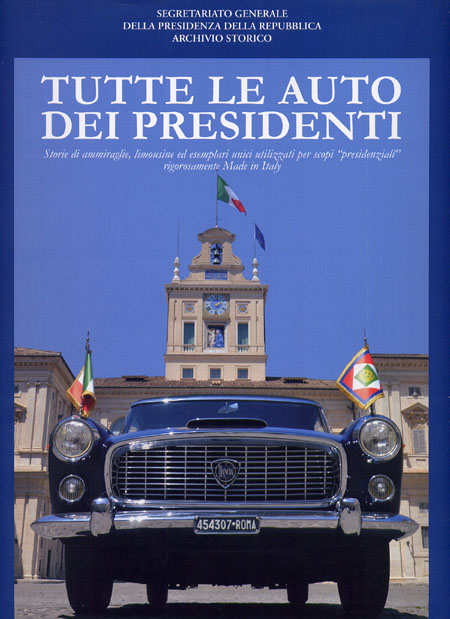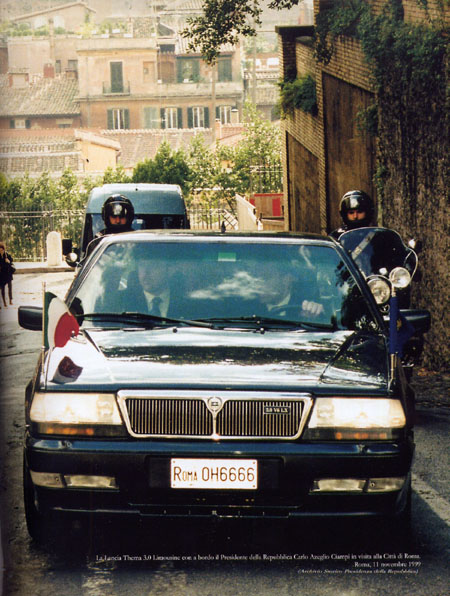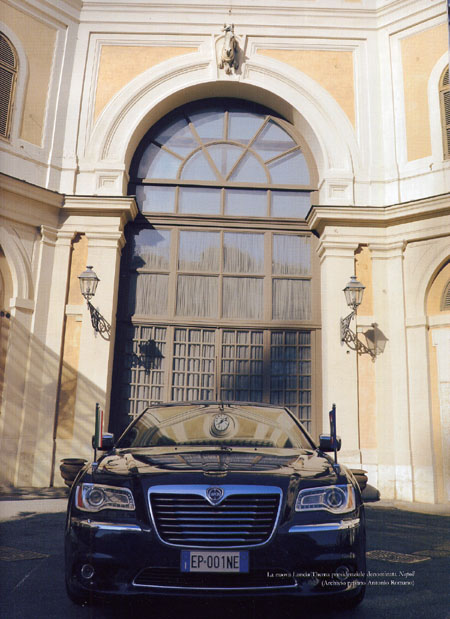Ca sa fiti la curent cu noutatile FGR, dati like la urmatoarele pagini facebook:
https://ro-ro.facebook.com/pages/FIAT-Group-Rom%C3%A2nia/492749384172922
https://www.facebook.com/Fiat.Romania
https://www.facebook.com/Maserati.Romania
https://www.facebook.com/Alfa.Romeo.Romania
https://www.facebook.com/FiatServiceRO
https://www.facebook.com/Abarth.Romania
https://www.facebook.com/JeepRomania
Ce pagina lipseste ? Ghici ...
Logo 1907
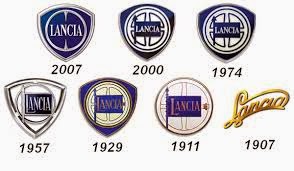
miercuri, 24 decembrie 2014
marți, 9 decembrie 2014
Tutte le Auto dei Presidenti - Lancia models
Maserati Quattroporte III - 1983 bis 1985
Ich stand auf der Classic Expo 2014 in Salzburg vor dem Stand von Gilena und studierte das ca. 15 m lange Angebot des renommierten italienischen Buchhändlers. Fokus auf Lancia, weil es in Italien Literatur gibt, die kaum ins Ausland kommt. Nichts gefunden, was ich nicht schon in meiner Bibliothek habe.*) Aber halt! Ganz oben auf der Galerie ein Buch mit einer Flaminia auf dem Titelbild und dem gelben Hinweiszettel in perfektem Italienisch: NEW!
24 x 33 cm groß, eine Flaminia vor einem Palast mit italienischer Fahne, Standarten an den vorderen Kotflügel – muss wohl die „Presidenziale“ sein, von der man in der Literatur nur unscharfe s/w-Fotos findet. Das schwere Buch von der Galerie gestemmt, kurz hineingeschaut und sofort gekauft:
Diese kurze Buchbesprechung ist bewusst in der Rubrik Motoring Art platziert, weil Thema und Aufmachung über reine Technik hinausgehen. Der Autor Antonio Romano hat mit/für das “Segretariato Generale della Presidenza della Repubblica” und dessen Archivo Storicho einen Prachtband gestaltet, der auf 364 Seiten die Präsidentenfahrzeuge der Republik Italien nach dem 2. Weltkrieg präsentiert. Hiefür nutze er die Dokumente und Fotos aus vielen italienischen Archiven: der Präsidentenkanzlei, der Deputiertenkammer, des Senats, des Automobilmuseums Turin, Pininfarina und viele Privatsammlungen. Richtig, von Lancia ist (natürlich) nichts dabei. Obwohl Lancia mit der Flaminia 1957 bis zum Thema 2012 zehn der Präsidentenlimousinen stellte.
Lancia Thema 3.0 V6 - 1993 bis 1999
Nach den Vorworten der leitenden Herren der Präsidentenkanzlei, des Archivs und des Museums Turin werden die Anforderungen an eine Präsidentenlimousine, Garage und Werkstätte gezeigt. In chronologischer Reihenfolge werden mit großen, ganzseitigen Fotos – ab 1957 in Farbe – die Fahrzeuge im Detail (Innenraum) und im Einsatz bei offiziellen Anlässen gezeigt. Fast alle Limousinen wurden für die Dokumentation im Hof des Quirinalpalastes aufgestellt und auch in Einzelfotos vor dem imposanten Hintergrund fotografiert.
Der „Kampf“ um die Präsidentenlimousine war zu Beginn etwas bunter, weil es noch mehrere italienische Hersteller gab, bis schließlich FIAT „Mutter“ aller möglichen Hersteller wurde und die Produktportfolios der Töchter kaum noch Alternativen boten. Kurz noch die Liste der Marken und Typen:
1946 – Fiat 2800 Torpedo – 1957 Lancia Flaminia – 1961 Lancia Flaminia 335 – 1971 Fiat 130 – 1975 Alfa Romeo 2000 Berlina – 1980 Alfa Romeo Alfa 6 – 1983 Maserati Quattrporte III – 1985 Lancia Thema – 1987 Lancia Thema 8.32 – 1989 Lancia Thema 2.8 V6 Limousine – 1991 Alfa Romeo 164 – 1993 Lancia Thema 3.0 V6 Limousine – 1999 Lancia K Limousine – 2003 Lancia Thesis Limousine – 2004 Lancia Thesis – 2004 Maserati Quattroporte – 2012 Lancia Thema („Chrysler“).
Lancia Thema - ab 2012
Das große Format des Buches erlaubt kein schnödes Scannen der Fotos, bestenfalls Ausschnitte sind möglich. Das Buch erhalten Sie im qualifizierten Buchhandel, derzeit sicher bei Gilena – www.gilena.it um 45,00 € + Versandspesen. Oder direkt beim Verlag www.gangemieditore.it
Antonio Romano, Tutte le Auto dei Presidenti, Gangemi Editore, Rom, 2014, ISBN: 978-88-492-2626-3
E. Marquart / 11.2014
Lancia Flaminia 335 - 1961 bis 1971
http://www.lancianews.com/main.php?id=681&cat=Motoring%20Art
miercuri, 3 decembrie 2014
Lancia and OffiCine award the winners of “Ypsilon My Stories”
 |
02/12/2014
|
Lancia
in support of young talents once again: two outstanding film-makers who
took part in the film-making project launched by the Lancia Brand in
conjunction with OffiCine - a project by Anteo and the European Design
Institute - were awarded yesterday in Milan. They were picked among ten
competing short films starring the Lancia Ypsilon, the fashion city car
that guarantees extensive customisation, sophisticated equipment and
distinctive style. After the awards ceremony, an informal get-together
was held on the bond between the car world and the movie world.
The
awards ceremony for the "Ypsilon My Stories" film-making competition,
the initiative resulting from the collaboration between the Lancia brand
and OffiCine, the film training and experimental workshop founded in
Milan by Anteo spazioCinema and the European Design Institute, took
place yesterday in Milan.
The event was hosted at the charming Fonderia Napoleonica Eugenia, formerly a prestigious bronze foundry and now a place of work, art and culture used as a venue for exhibitions, events and cultural initiatives.
The event was hosted at the charming Fonderia Napoleonica Eugenia, formerly a prestigious bronze foundry and now a place of work, art and culture used as a venue for exhibitions, events and cultural initiatives.
The
winners of the "Ypsilon My Stories" project are the Spaniard Daniel
Pedrosa with his film "Microtheatre" and the Italian Iacopo Di Girolamo
with his work entitled "An Expat in Bruxelles". The first was awarded a
Lancia Ypsilon on free loan for 3 months, while the second received a
shield by the Lancia brand. Specifically, the work by the Spanish
film-maker was selected by the technical jury who included, among
others, the director Silvio Soldini - who this year won the Silver
Ribbon award for best documentary with his docu-film "Per altri occhi"
(for other eyes) - and the director of photography Luca Bigazzi, who has
won both the David di Donatello award and the Silver Ribbon award on
several occasions and who has worked with Oscar award-winning directors
the likes of Paolo Sorrentino, Mario Martone, Gianni Amelio and Silvio
Soldini. The video entitled "An Expat in Bruxelles" by Jacopo Di
Girolamo was instead selected by the popular jury who expressed their
opinion by an on-line vote on the dedicated website between 17th September and 16th October.
After
the awards ceremony, an informal get-together was held, moderated by
Giovanni Ottonello, Art Director of the European Design Institute (IED),
involving the participation of Antonella Bruno, Head of EMEA Lancia
Brand, Cristina Marchetti, Workshop Management, the director Silvio
Soldini, the director of photography Luca Bigazzi and the director Paolo
Borraccetti.
With the "Ypsilon My Stories" project, the Lancia
brand confirms its focus on the world of Art and Design, a
communication "territory" in which it has proved to be at ease. This is
extensively testified by LanciaTrendVisions.com, the scouting
website which since 2010 provides visibility to emerging creative
talents; indeed, on the one hand, it offers a daily selection of new
works by young talents, and on the other it hosts editorials and
interviews with established and emerging creative minds, in an active
and engaging dialogue.
Indeed,
the Lancia TrendVisions web magazine selected the work entitled "Il
Giardino delle Rose" (the Garden of Roses) by the young designer Rita
Valente exhibited at the 21st edition of "Artissima", an International
Contemporary Art Exhibition which saw Lancia participating as Partner
for the first time ever. The star of the work is the new Ypsilon Elle,
the special series which was only launched a few weeks ago.
For
the "Ypsilon My Stories" project, Lancia and OffiCine have selected ten
outstanding film-makers from various European countries. The desired
qualities? Proven experience in the field, a great deal of curiosity and
the ability to express the contemporary world, the city and the Ypsilon
with a personal approach.
After
an individual interview and a Masterclass in Milan, the chosen
directors were set the task of lending creative interpretation to the
unique relationship that connects the Ypsilon and urban space. The
result is ten highly diverse short films, ten stories in which to
discover the unseen faces of the European metropolises and the tales of
the people who bring them to life. The Ypsilon is the star with its
unique style, its sustainability and the equipment of a higher category
like the magic parking.
The
ten films were available on the dedicated website, where users who
registered between 17th September and 16th October were able to vote for
them. What's more, the winner of a trip for two to one of the
wonderful destinations illustrated in the short films was picked out
among all the voters: the cities were Vienna, Berlin, Lisbon, Paris,
Marseilles, Brussels, London, Milan, Rome or Madrid. What's more, for
the entire duration of the contest, Lancia put an instant win €100
Amazon voucher up for grabs every day.
It
should also be noted that the OffiCine Workshop boasts names the likes
of Paolo Sorrentino and Pierfrancesco Favino, Silvio Soldini, Piera
Detassis and Paolo Mereghetti as members of its scientific committee. It
is therefore a prestigious concern which offers multidisciplinary
teaching programmes in film- and video-making and organises cultural
initiatives, with the aim of bringing a wide and multifarious audience
to the world of the cinema.
The
chosen location of the awards ceremony is truly special: the charming
Fonderia Napoleonica Eugenia. Its history is tied closely to that of the
Isola neighbourhood and to the Santa Maria alla Fontana sanctuary. With
Napoleon's arrival, it was decided that some of the amenities would be
intended to build a bronze foundry, which was entrusted to the
Manfredini brothers, who were expert founders and goldsmiths, called
back from Paris for the occasion.
The
artistic activities of the Fonderia stand out for the significant
casting of monuments to Alessandro Manzoni and to Luciano Manara, which
are situated in Piazza San Fedele and in the Public Gardens in Milan
respectively. In 1896 the foundry completed the casting - which entailed
major technical expertise - of the equestrian statue for the monument
to Vittorio Emanuele II in Piazza Duomo in Milan, the work of sculptor
Ercole Rosa. In the decades that followed, the artistic castings
continued, with the creation of countless works of art, intended for
both Italy and abroad.
The complex and articulated story of the foundry ended in 1975, the year in which it closed down.
Now the facilities have been turned into a place of work, art and culture used as a venue for exhibitions, events and cultural initiatives.
Now the facilities have been turned into a place of work, art and culture used as a venue for exhibitions, events and cultural initiatives.
Abonați-vă la:
Comentarii (Atom)
